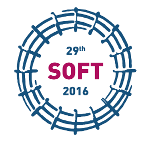Speaker
Luis Maqueda
(Esteyco Mechanics)
Description
General purpose finite element (FE) softwares can be readily used for the stationary analysis of breeding blankets of a nuclear fusion reactor. However, the analysis of transient effects generated during the pulsed operation mode requires transient simulations to be carried out. Nowadays, a commercial tool which can be directly used for these transient simulations with affordable computational times and taking into account the coupling of the transient temperature evolution of the structure and the coolants is not available in FE commercial codes, mainly due to the very high number of cooling channels present in this type of component and the numerical stability condition associated to existing forced convective/diffusion elements available in the libraries. In the present work, a simplified but realistic methodology able to predict the evolution of the coolant temperature which can be coupled through user subroutines with the general solution of the FE representation of the structure has been developed, allowing for the resolution of the pulsed transient problem. The methodology developed has been used to analyze the feasibility of the DCLL DEMO blanket conceptual design being currently developed by CIEMAT from a structural point of view. In particular, the structural response of the blanket OB equatorial module for two representative scenarios, which are expected to drive the design, has been studied: pulsed normal operating conditions and LOCA (Loss of Coolant Accident) conditions. In order to precisely assess the structural response of the DCLL module, the corresponding capacity checks have been carried out. To that end, a global methodology which allows for the capacity check assessment of multiple failure modes (based on RCC-MR and ISDC-IC design codes) and a very large number of locations (supporting lines), combining the different time instant of pseudo-static and transient loads including gravity, pressure, thermal, seismic and electromagnetic loads has been developed.
Co-authors
David Alonso
(Esteyco Mechanics, Esteyco, Madrid, Spain)
David Rapisarda
(Fusion, CIEMAT, Madrid, Spain)
Fernando Rueda
(Esteyco Mechanics, Esteyco, Madrid, Spain)
Ivan Fernandez-Berceruelo
(Fusion, CIEMAT, Madrid, Spain)
Jorge Olalde
(Esteyco Mechanics, Esteyco, Madrid, Spain)
Luis Maqueda
(Esteyco Mechanics, Esteyco, Madrid, Spain)

